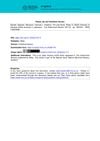 19 citations,
July 2015 in “Journal of Ginseng Research”
19 citations,
July 2015 in “Journal of Ginseng Research” Korean Red Ginseng may protect against hair loss caused by chemotherapy.
November 2022 in “Journal of Nanobiotechnology” The developed system could effectively treat hair loss and promote hair growth.
62 citations,
July 2022 in “Science Immunology” TREM2 macrophages and unsaturated lipids contribute to acne inflammation.
 31 citations,
January 2017 in “Advances in Experimental Medicine and Biology”
31 citations,
January 2017 in “Advances in Experimental Medicine and Biology” Low testosterone and 5α-reductase inhibitors can harm men's metabolic and sexual health; testosterone therapy may help, but discussing 5α-RIs' side effects is important.
 17 citations,
November 2000 in “Journal of the American Pharmaceutical Association”
17 citations,
November 2000 in “Journal of the American Pharmaceutical Association” The document concludes that low-dose oral contraceptives and hormonal therapies can manage perimenopause symptoms and reduce some health risks, but lifestyle changes and disease screening are also important.
 January 2025 in “bioRxiv (Cold Spring Harbor Laboratory)”
January 2025 in “bioRxiv (Cold Spring Harbor Laboratory)” Potential therapeutic targets for scarring hair loss are identified.
 581 citations,
October 1998 in “Journal of The American Academy of Dermatology”
581 citations,
October 1998 in “Journal of The American Academy of Dermatology” Finasteride safely and effectively treats male pattern hair loss, but may cause reversible sexual issues and harm male fetuses.
 9 citations,
May 2019 in “Experimental Cell Research”
9 citations,
May 2019 in “Experimental Cell Research” HPV genes and estradiol increase a cancer-related signaling pathway, which may be targeted for cervical cancer treatment.
 October 2024 in “Frontiers in Veterinary Science”
October 2024 in “Frontiers in Veterinary Science” FKBP10 and FBN2 are key proteins for hair growth in cashmere goats.
 January 2025 in “Scientific Reports”
January 2025 in “Scientific Reports” Hair analysis can show changes in vitamin D levels over time.
 25 citations,
July 2019 in “Journal of drug delivery science and technology”
25 citations,
July 2019 in “Journal of drug delivery science and technology” Researchers created better skin-application menthol capsules that are stable, safe, and penetrate the skin quickly.
 March 2023 in “Scientific Reports”
March 2023 in “Scientific Reports” Using focused ultrasound on the brain can help epilepsy medicine work better in rats.
 50 citations,
February 2013 in “Annals of Clinical Biochemistry”
50 citations,
February 2013 in “Annals of Clinical Biochemistry” Understanding how DHT works is important for diagnosing and treating hormone-related disorders.
 March 2014 in “Journal of The American Academy of Dermatology” 16 citations,
October 2004 in “Journal of Investigative Dermatology”
March 2014 in “Journal of The American Academy of Dermatology” 16 citations,
October 2004 in “Journal of Investigative Dermatology” Normal human melanocytes can avoid cell death through multiple pathways.
64 citations,
March 2004 in “Journal of Clinical Investigation” Targeting ornithine decarboxylase can help prevent skin cancer.
 October 2024 in “International Journal of Ayurveda Research”
October 2024 in “International Journal of Ayurveda Research” Emblica officinalis and Eclipta alba may help treat hair loss naturally.
 39 citations,
March 2019 in “Dermatologic Surgery”
39 citations,
March 2019 in “Dermatologic Surgery” PRP therapy increases hair density for androgenetic alopecia.
65 citations,
March 2004 in “Journal of Clinical Investigation” Inhibiting ornithine decarboxylase may help prevent certain skin cancers.
 6 citations,
July 2021 in “The anatomical record”
6 citations,
July 2021 in “The anatomical record” Different whale and dolphin species have unique whisker follicle structures, suggesting they might use their whiskers in various ways.
 June 2023 in “Current Issues in Molecular Biology”
June 2023 in “Current Issues in Molecular Biology” DN106212, an extract from a plant, is better at promoting hair growth than other tested substances by affecting hair growth factors and follicle development.
 November 2010 in “Journal of The American Academy of Dermatology”
November 2010 in “Journal of The American Academy of Dermatology” The issue concluded that various skin conditions have different effective treatments and factors influencing them.
 3 citations,
February 2016 in “Nature Biotechnology”
3 citations,
February 2016 in “Nature Biotechnology” New drug shows promise for better hair growth in baldness treatment.
 8 citations,
May 2017 in “Chinese Journal of Integrative Medicine”
8 citations,
May 2017 in “Chinese Journal of Integrative Medicine” Miscanthus sinensis flower extract may help promote hair growth and prevent hair loss.
 187 citations,
January 1994 in “The New England Journal of Medicine”
187 citations,
January 1994 in “The New England Journal of Medicine” Finasteride treats enlarged prostate and may help with baldness, but effects on sexual function and male fetuses are unclear.
14 citations,
April 1978 in “International Journal of Dermatology” Antiandrogens can treat acne, hirsutism, and seborrhea by reducing sebum production and androgen action.
 234 citations,
September 2004 in “Clinical cancer research”
234 citations,
September 2004 in “Clinical cancer research” BAY 43-9006 helps control kidney cancer growth but doesn't significantly increase overall survival.
 34 citations,
July 2011 in “Journal of Dermatological Treatment”
34 citations,
July 2011 in “Journal of Dermatological Treatment” Curcuma aeruginosa extract combined with minoxidil effectively treats male-pattern baldness.
 January 2016 in “Human & Experimental Toxicology”
January 2016 in “Human & Experimental Toxicology” A specific DNA sequence caused hair loss in male mice by activating immune cells and increasing a certain immune signal.
 3 citations,
August 2020 in “PubMed”
3 citations,
August 2020 in “PubMed” Platelet-rich plasma (PRP) is effective in treating various skin conditions and improving hair density, thickness, and patient satisfaction, with lower relapse rates for Alopecia Areata.
























